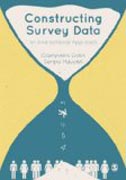
Engaging and informative this book provides students and researchers with a practical introduction to the process of collecting and analysing survey data. By proposing a post-positivist, interviewee-centred approach, it improves and maximises the quality of survey data by emphasising the interaction between interviewer and interviewee. Bringing together traditional methodology and contributions from linguistics, anthropology, cognitive studies and ethnomethodology, Gobo and Mauceri analyse the answering process in structured interviews built around questionnaires. The following key areas are explored in detail: An historical overview of the field The survey within global and local contexts Combining quantitative and qualitative methods The process of preparing the survey and designing data collection The methods of detecting bias and improving data quality Incorporating the work of experts in interpersonal and intercultural relations, this book gives readers an intriguing new perspective on survey research. INDICE: Introduction: Rescuing the surveyPART ONE: THE CONTEXTSurveying the Survey: Back to the Past The Making of the 'Survey Society': The 19th Century The Common Roots of the Survey and In-depth Interview The Pioneers: 1880 - 1935 Technical Improvements and the Abandonment of Mixed Methods The Idea of Standardizing the Survey Interview The Split between Quantitative and Qualitative Methods The Explosion and Institutionalization of Surveys Technical Modifications toward a Standardized Interview The Decline of the Concern for Data Collection The Globalization of the Survey Culture Model Concluding RemarksBack to the 'Golden Age': Towards a Multilevel Integrated Survey Approach What is Survey Research? From the Standard to the Multlievel and Integrated Survey Approach Concluding RemarksPART TWO: FROM QUESTIONS TO ANSWERSThe Answering Process What Lies Behind the Datum? The Co-construction of Survey Data The 'Cognitive Turn' and the CASM Movement Inference Procedures Situation Awareness The Limits of the 'Cognitive Turn' and Social Information Processing (SIP) From Cognition to Interaction: The Pragmatic Turn The Logic of Conversation Concluding RemarksAsking and Questioning Attributing Meanings to Questions Evaluation: The Heuristics of Judgement An Alternative Typology: Cognitive Tasks and Response Alternatives Concluding RemarksAnswers: Cognitive Processes Open-ended or Closed-ended? Facing the Dilemma Scalar Answers The Influence of the Response Alternatives The Pragmatics of Response Alternatives Response Alternatives and Linguistic Communities Researchers versus Interviewees? Towards a Reconciliation of Separate Worlds Concluding RemarksCommunicative Processes Psychological States of Interaction Social Conventions Answers and Interviewees' Demographic Characteristics The Setting Concluding RemarksThe Living Questionnaire: The Survey at Work The Initial Contact with Interviewees The Nonresponse Phenomenon The Sociology and Psychology of Nonresponse The Questionnaire in Action Incongruences in the Answers Concluding RemarksPART THREE: CONSTRUCTING ANSWER COMPARABILITYFrom Standardization of Stimuli to Standardization of Meanings: The Interactional Survey Approach The Behaviourism-based SSA: The Standardization of Stimuli The Interactional Survey Approach: Standardizing Meanings Bridging the Gap between Questionnaire (Researcher) and Interviewee: Empowering the Interviewer Standardizing the Meaning of Response Alternatives Too Concluding RemarksTraining for the Interactional Survey Approach Motivating the Interviewee by Following the Norms of Conversation The Interviewer's Hermeneutic Role The Specific Hermeneutic Competence of Interviewers Evaluation of Interviewer Performance Concluding RemarksPART FOUR: DATA QUALITY AND MIXED METHODSRe-conceptualizing Data Quality What is Data Quality? Dimensions of Data Quality From Data Quality to Survey Quality Concluding RemarksMixed Survey Strategies: Quality in the Quantity What is Mixed Methods Research? Mixed Strategies: The Proportion of Quality and Quantity in a Research Design The Integrative Role of Qualitative Procedures in the Survey: A Typology The Pilot Study: Orientation of the Data Construction Process Concluding RemarksPretesting Strategies: Assessing Data Quality in Advance Aims of Pretesting Pretesting Strategies based on Manifest Evidence Qualitative Strategies: Inside the Black Box to Discover the Hidden Biases Concluding RemarksDeviant Case Analysis: Improving Data Quality The Limitations of Monitoring Techniques within the Data Matrix Deviant Case Analysis (DCA): The Exception that Refines the Rule The Functions of Deviant Case Analysis Exploring Deviant Cases: Some Techniques Concluding RemarksPART FIVE: ENVISIONING THE FUTUREGlocalizing the Survey Towards Multicultural Methodology The Global Survey and its Discontents: The Limits of Current Survey Methodology An Individualist Social Philosophy Western Tacit Knowledge Embedded in the Survey Model Lessons Learned from Cross-Cultural Surveys De-colonizing the Survey The Local Structural Context Combining Global and Local Brand New: Re-Styling the Survey Concluding Remarks
- ISBN: 978-1-84920-176-6
- Editorial: SAGE Publications Ltd
- Encuadernacion: Cartoné
- Páginas: 352
- Fecha Publicación: 14/04/2014
- Nº Volúmenes: 1
- Idioma:
